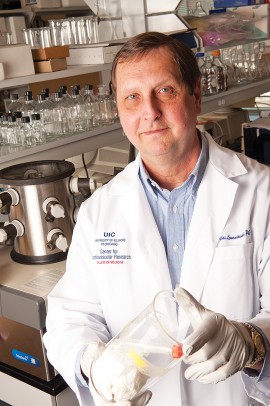Healthy fats help diseased heart muscle process, use fuel

E. Doug Lewandowski, director, UIC Cardiovascular Research Center. Photo: Joshua Clark/UIC Photo Services (select image to download)
Oleate, a common dietary fat found in olive oil, restored proper metabolism of fuel in heart cells in an animal model of heart failure.
The findings are reported in the journal Circulation by researchers at University of Illinois at Chicago College of Medicine.
Heart failure affects nearly 5 million Americans, and more than half a million new cases are diagnosed each year. Heart failure is not the same as having a heart attack — it is a chronic disease state where the heart becomes enlarged, or hypertrophic, in response to chronic high blood pressure which requires it to work harder to pump blood. As the heart walls grow thick, the volume of blood pumped out diminishes and can no longer supply the body with enough nutrients.
Failing hearts are also unable to properly process or store the fats they use for fuel, which are contained within tiny droplets called lipid bodies in heart muscle cells. The inability to use fats, the heart’s primary fuel source, causes the muscle to become starved for energy. Fats failing hearts manage to metabolize break down into toxic intermediary by-products that further contribute to heart disease.
The UIC researchers looked at how healthy and failing hearts beating in rats reacted to being supplied with either oleate or palmitate, a fat associated with the Western diet and found in dairy products, animal fats and palm oil.
When the researchers perfused failing rat hearts with oleate, “we saw an immediate improvement in how the hearts contracted and pumped blood,” said E. Douglas Lewandowski, director of the UIC Center for Cardiovascular Research and senior and corresponding author on the study.
Lewandowski and colleagues tracked the location of fat molecules in the cells of the diseased hearts by tagging them with a nonradioactive heavy isotope of carbon, which is detected using magnetic resonance spectroscopy. This technology allows researchers to watch biochemical reactions, like metabolism, as they occur in real-time in functioning organs. Using this technique, Lewandowski noticed that the metabolism of fats within the cardiac cells of these hearts became normalized.
In contrast, when the researchers perfused the diseased hearts with palmitate, fat metabolism was imbalanced, and cells struggled to access fuel. There was also a rise in toxic fatty byproducts — another consequence of dysregulated or impaired fat metabolism.
In addition to balancing fat metabolism and reducing toxic fat metabolites in hypertrophic hearts, Lewandowski said, oleate also increased the activation of several genes for enzymes that metabolize fat.
“These genes are often suppressed in hypertrophic hearts,” he said. “So the fact that we can restore beneficial gene expression, as well as more balanced fat metabolism, plus reduce toxic fat metabolites, just by supplying hearts with oleate – a common dietary fat — is a very exciting finding.”
“This gives more proof to the idea that consuming healthy fats like oleate can have a significantly positive effect on cardiac health,” Lewandowski said — even after disease has begun.
UIC College of Medicine Medical Scientist Training Program student Ryan Lahey is the lead author on the paper. Postdoctoral fellow Andrew Carley, and Xuerong Wang, research specialist, are co-authors.
The research was supported by National Heart, Lung and Blood Institute grants R37 HL40244 and RO1 HL62702 and American Heart Association Predoctoral Fellowship grant 12PRE1178002.
